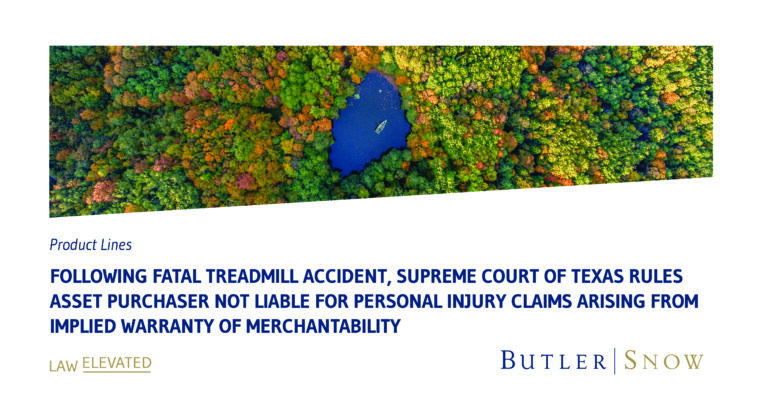On October 23, 2020, the Supreme Court of Texas ruled on Northland Industries Inc. v. Kouba,[1] a case arising from a fatal treadmill incident. The Court held that the purchaser of the treadmill’s manufacturer did not assume implied product warranties via the asset purchase agreement in which it assumed only written warranties for repair or replacement of defective treadmill parts.
Audrey Kouba (“Kouba”) sustained fatal injuries when she fell while using the treadmill at her local gym. Her estate claimed that the treadmill was defective and changed speeds unexpectedly. The treadmill was manufactured and sold by Northland Industries, Inc. (“Northland Industries”). JHTNA Manufacturing, L.L.C. (“JHTNA”) purchased Northland Industries’ assets and assumed certain of its liabilities and obligations, as “specifically identified” in the asset-purchase agreement. Following the asset-purchase transaction, Northland Industries dissolved.
The Kouba estate sued JHTNA for negligence, strict liability, and breach of implied warranty of merchantability under Texas Business and Commerce Code section 2.314. JHTNA moved for summary judgment on all claims, asserting that (1) as an asset purchaser, it has no liability other than expressly assumed liability, and (2) under the asset-purchase transaction, it assumed liability only for express repair-or-replacement warranties and expressly disclaimed any liability for bodily injury claims. The trial court, the 25th District Court in Colorado County, granted summary judgment in JHTNA’s favor as to all claims.
On appeal, Kouba challenged summary judgment solely as to the implied warranty of merchantability. The appeals court reversed, holding that (1) under the asset purchase agreement’s terms, the buyer assumed liability for implied warranties, and (2) the asset-purchase agreement excludes liability for bodily injury claims only when those claims are accompanied by claims for property damage. However, the Supreme Court of Texas disagreed.
The Supreme Court of Texas’ analysis followed the rule of successor liability, which provides that the asset purchaser does not assume the seller’s liabilities for harm caused by defective products the predecessor sold commercially, except for expressly assumed-liabilities.[2] Accordingly, the Court, examined the asset-purchase agreement to determine whether the buyer agreed to assume liability for the implied warranty terms.
The Court found that based on the language of the contract, JHTNA only agreed to assume “specifically identified” liabilities and obligations, such as lease obligations, various forms of taxes, certain accounts payable, and certain product warranty claims.[3] Product warranty claims included were “solely” those arising from the seller’s written warranties as specifically identified and attached to the asset purchase agreement.[4] The attached Commercial Treadmill Warranty included language only regarding repair or replacement of the product and provided no additional coverage for consequential damages arising from the use or non-use of the product.[5]
The Supreme Court concluded that JHTNA did not assume the seller’s implied warranty obligations and thus has no liability for breach of the implied warranty of merchantability as a matter of law.[6] On that basis, the Supreme Court held that the trial court properly granted summary judgment.[7]
On November 24, 2020, the Kouba estate filed a motion for rehearing with a two-part argument. First, Kouba claims that the Supreme Court’s opinion fails to follow the well-known rules of contract construction, resulting in what the estate claims was a revision of the Purchase Agreement. Second, Kouba claims that the Court’s opinion risks changing the fundamental concept that implied warranties attach only to contracts for the sale of goods.
We will continue to monitor and keep you apprised of further developments. Stay tuned.
[1] Northland Indus., Inc. v. Kouba, 19-0835, 2020 WL 6255405 (Tex. Oct. 23, 2020).
[2] Id. at *3.
[3] Id. at *4.
[4] Id.
[5] Id. at *5.
[6] Id. at *6.
[7] Id.
